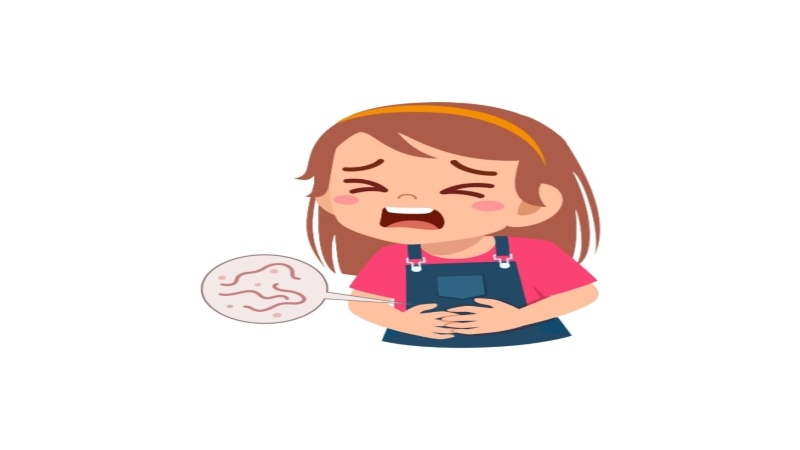
An ‘upset tummy’ is perhaps the most common complaint in young children. We often ignore this complaint and consider it as a tantrum to avoid school. What if there is really something wrong with him? If your kid complains anything about health to you, it’s your duty to listen him out before brushing it as a tantrum or an excuse. Intestinal infection is one of the leading causes of stomach ache in children. Such infections in young children are mostly caused by intestinal parasites such as worms. These worms then live in the intestine and feed on your child’s nutrition, rendering him ill. However, no need to panic as yet as these worm infections are quite common and can also be readily treated.
- Types Of Worm Infections
- Symptoms Of Worm Infections In Children
- Causes Of Worm Infection In Children
- Worm Infection Treatment
- Preventing Worm Infection In Children
Types Of Worm Infections
There is countless number of species in this world. These parasites, which harbor in your child’s intestine also come in various forms, shapes and sizes. Below are the most common types of worm infections that trouble children:
- Tapeworms: These are flat, ribbon-like worms that can grow up to 15-30 ft and thrive in the intestine
- Roundworms: They resemble earthworms and can grow up to the size of 30-35 cm
- Pinworms or thread-worms: As the name suggests, thread-worms appear to be fine white cottony threads and live in intestine and around anus of the individual
- Hookworms: These are commonly contracted through coming in touch with the contaminated soil and later enter intestine
Symptoms Of Worm Infections In Children
Apart from a stomach ache, irritability and some weight loss, worm infection can be denoted by following signs:
Tapeworm Infection
- Nausea and vomiting
- Loss of appetite, sometimes eating too frequently and weight loss: These usually appear in case of infection by tapeworms. Malnutrition may also be seen
- Jaundice: this is more common in tapeworm infections
Thread-worm Infection
- Itching around anus is a common complaint in children who have thread-worm infection. Thread-worms creep out during night and lay eggs near anus which can trigger itching
- Trouble sleeping (due to itching)
- Painful urination: this is typical in thread-worm infestation
Roundworm Infection
- Diarrhea, Passing worms with stools: If roundworm infection persists, then mature worms may be passed out from stools
- Fever and dry cough: These are spotted within 4-16 days after coming in contact with the roundworm eggs
Hookworm Infection
- Coughing, wheezing: Such respiratory troubles may crop up when the hookworm larvae attack lungs
- Anemia, fatigue: These symptoms can be seen in case of severe hookworm infection
You may also observe bed wetting, blood in stools in your child if he is having an intestinal worm infection.

Causes Of Worm Infection In Children
Due to the dynamic nature of kids, jumping on the bed to crawling in the park – they are more likely to come in contact with germs. A few common causes of worm infection include:
- Coming in contact with infected surface: The worms and their eggs are capable of surviving up to two weeks without feeding. Some of the most common places where your kid may contract worm infestation are:
- soil containing worms or eggs – in playground or outdoor play
- touching pets or their excrement infected with worms
- Inadequate hand washing: It’s difficult to keep young kids from putting things in their mouth. If your kid is suffering from worms, there will be itching around anus, particularly in case of pin worms. During scratching, the eggs of the worms come in contact with the skin on hand, which wherever touched tends to spread. The worst scenario is when kids put that hand back in the mouth, such as for thumb sucking or pleasure. Read more about children and
- Improper hygiene: Unwashed bedding, undergarments, filth in the room all present breeding room for worms and their eggs. Someone who has not washed hands properly can also pose a risk for others as worm eggs can stay on fingernails which can be passed to you child through touching
- Consuming infected food or water: It is very important to wash vegetables and fruits before consumption as worm eggs can be on them. Raw or under-cooked food also carries a risk of worm infestation. Contaminated water is again a very common source of worm infestation
Worm Infection Treatment
The treatment of worm infection is quite simple and often required a course of anti-parasitic medicine to be followed. Anti-worm medications or de-worming treatments are easily available as over-the-counter medications, but exercise caution when administering medicines to your child. Since worm infections can hinder growth and development of your kid, it’s best to obtain professional advice from the physician. Moreover, not all OTC medicines may be advisable for a baby less than 2 years of age. The physician may perform certain tests, consider symptoms and prescribe suitable medication depending on the diagnosis. Hygiene alone will prevent the further growth of worms and assumes a lot of importance. Hygiene complemented with medication will expedite recovery.

Preventing Worm Infection In Children
Yes, you can prevent worm infections. Hygiene here is crucial. Teach your kids basic hygiene habits and educate them about worms entering their body and making them sick. Below are a few more tips on keeping worm infestation at bay:
- Inculcate the habit of frequently and thoroughly washing the hands with a good antibacterial soap
- It’s a good idea to introduce hand sanitizer to the apple of your eyes
- Teach your kid to drink clean, filtered or boiled water. Practice the same at home
- Make sure your kids change their undergarments daily
- Wash their bedding, pillow covers, blanket etc. regularly
- Sterilize your toddler’s toys
- Encourage your kid to play in dry areas and not splash in muddy puddles as these horde millions of germs
- Make sure that your the veggies and meat are thoroughly cooked before you serve them to your kid
- Keep your kid’s nails well trimmed. Show them how dirt collects under long fingernails and must be kept clean
- Washing hands thoroughly before eating anything should be the rule!
- Teach potty hygiene
- Do not share towels and undergarments
- Teach your kid to shower regularly. Practice thorough cleaning of private parts
- Clean your house thoroughly and with proper disinfectants
- Allow plenty of sunshine in your kid’s room. Some worms are sensitive to light and nothing better than letting the sun do this job!
If untreated, worm infections may sometimes take a serious form of blocking intestine, attacking other organs and inhibiting your child’s growth. The good news is that these can be largely prevented. Just make sure that your hygiene mantra doesn’t hamper his childhood play!
